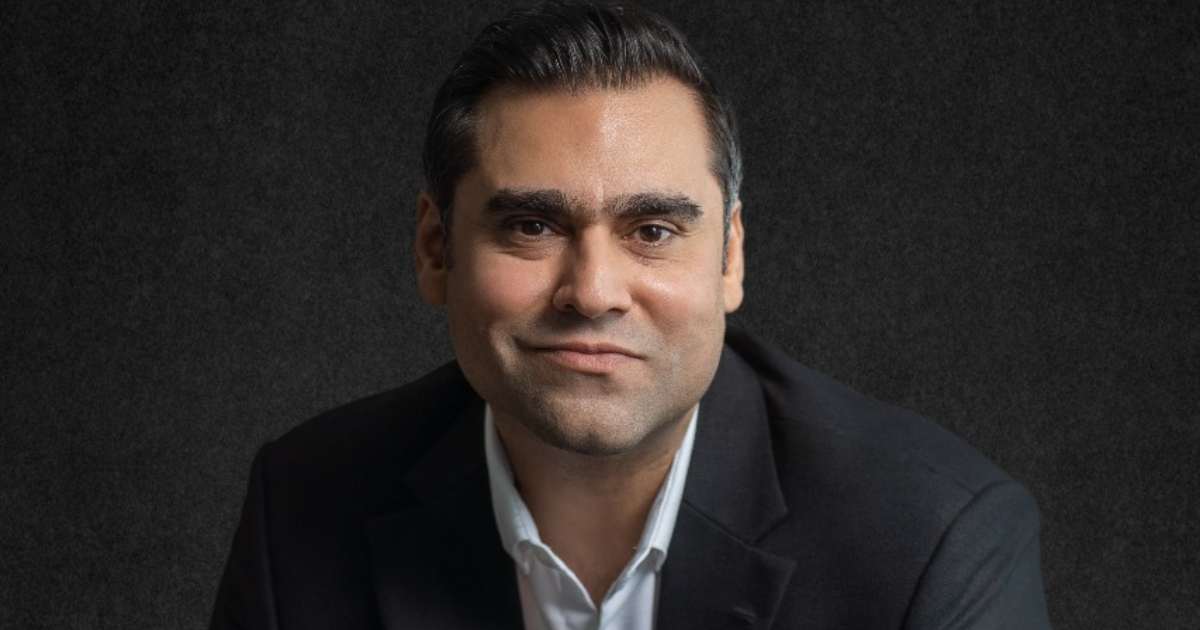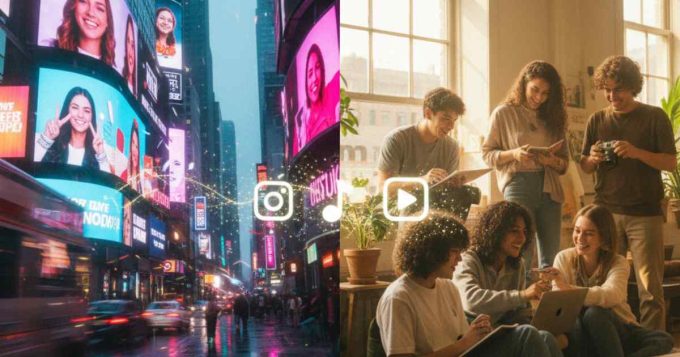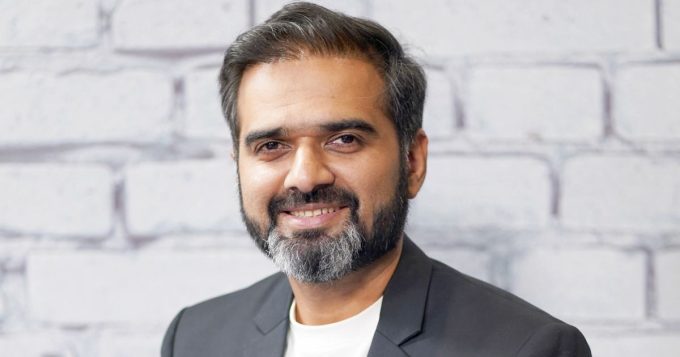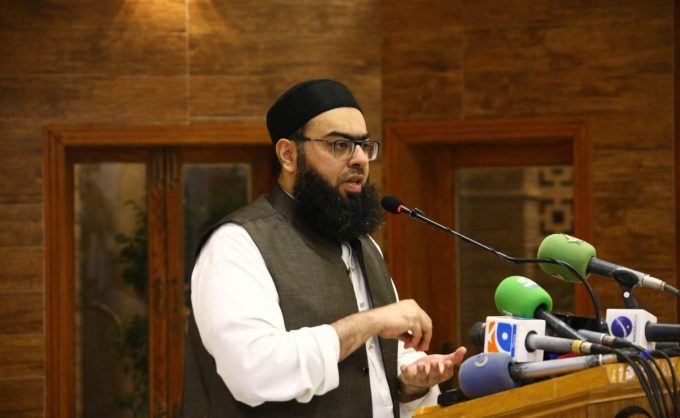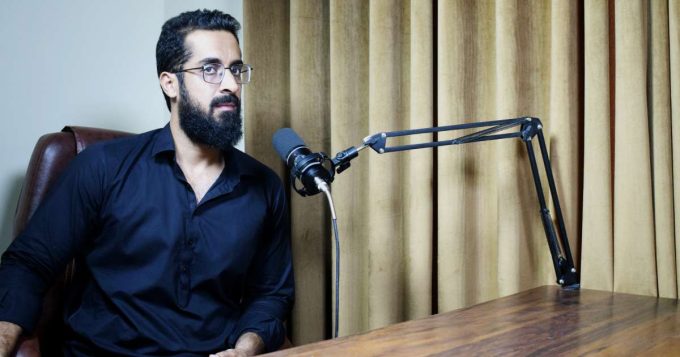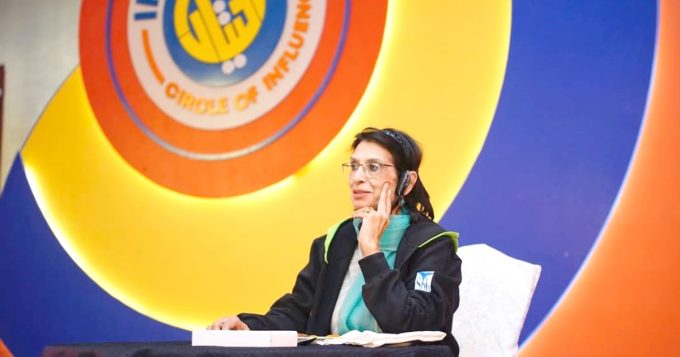Eat Food Pakistan – Omar Omari
Omar Omari is a seasoned marketing professional renowned for his brand management and business development expertise. He is a visionary food enthusiast who has revolutionised the culinary landscape through Eat Food Pakistan, a pioneering venture celebrating the diversity and richness of Pakistani cuisine. Omar has honed his skills in marketing strategy, team management, and business growth. He combines his passion for food, creativity, and technology with Eat Food Pakistan, creating a unique platform that inspires foodies and chefs alike. His initiatives focus on reclaiming and reactivating public spaces, bringing people together through initiatives that introduced Pakistan’s first dine-in Cloud Kitchens and food festivals.
Synergyzer: Could you tell us more about Eat Food Pakistan’s beginning and its journey since its establishment in 2014?
Omar Omari: Eat Food Pakistan was born in 2021 during COVID-19. However, the real basis of our journey into the food world began in 2014 with the Eat Festival. This festival was a way to give back to society by reclaiming our public spaces.
We chose Frere Hall for the event, and it wasn’t a business plan or something we had thoroughly thought through. It was simply a basic idea to organise a food festival, with food being the common denominator that brought people together.
We had no vision of what it would become today; our intention, or our ‘niyat’ as they say, came from a good place. It was about giving back to society and bringing people together at an event at Frere Hall.
The selection of Frere Hall was a conscious decision because we wanted to reclaim that park as a public space, which it hadn’t been for the longest time. The festival was an event that brought people together. Fast forward to 2021, when COVID hit, and that’s when Eat Food Pakistan was born, along with all the other verticals in our company.

Synergyzer: Would you like to share the journey of creating your brand, Eat Cloud, in 2021 and how it impacted the food industry in Pakistan? Did you consider how it would become so popular and be liked by all the foodies?
Omar Omari: Eat Cloud was born in 2021. We had been considering the next step after the festivals in Karachi, Lahore, Islamabad, and now Multan.
These festivals had become launching pads for many small businesses that started as stalls, like Juicy Lucy, Taco Cat, Fatso’s (now Easy), WingItt, Desi Gully, and Yeh Lo. All these businesses have grown and now have their branches.
We noticed that many businesses emerging from the festivals didn’t have the capital to invest in a restaurant or operations, so they continued to cater from home, remaining small until they could afford to expand.
To support these businesses, we created cloud kitchens. We handle all the operations, including delivery, kitchen setup, and providing the necessary machinery. Business owners just need to bring their chefs and cook, while we manage the rest.
Eat Cloud now operates in Khadda Market, Ayesha Manzil, and Gulshan Iqbal, with 10, 17, and 14 kitchens respectively. The setups at Ayesha Manzil and Gulshan Iqbal also have seating capacities for over 150 people, functioning more like food courts.
This allows businesses to own their restaurant without any setup or operational costs. The idea behind Eat Cloud is to help businesses start up without significant investment.
Synergyzer: The concept of cloud kitchens has gained traction globally. What led to the decision to introduce Eat Cloud, and how do you envision its growth and impact on the Pakistani food industry?
Omar Omari: Cloud kitchens have grown globally, typically operating as delivery-only spaces without frontage or seating. However, in Pakistan, we customised the concept to suit local preferences, where dining out is a major form of entertainment.
Unlike other countries, Pakistan lacks clubs and large sporting events, making food a central part of socialising. Globally, cloud kitchens are often situated in less prominent locations to reduce costs and rely on delivery companies like Foodpanda, Deliveroo, Uber Eats, and Just Eat.
In Pakistan, with only Foodpanda available, we integrated a dine-in experience into our model. Our cloud kitchens function more like food courts, offering delivery and takeaway but also providing seating for customers.
This allows businesses to operate as full restaurants without the setup costs. Entrepreneurs can start their operations within days, tailored to the Pakistani context.
Our cloud kitchens enable business owners to control quality and focus on food, while we handle operations. This makes it easier to grow, as many operational challenges are managed for them.
This model allows for expansion across cities, letting a business owner in Karachi manage operations in Lahore or Islamabad. By reducing costs and operational burdens, Eat Cloud helps foodpreneurs expand their sales, increase their customer base, and grow their businesses faster.
Synergyzer: Who creates the brand identity of your brands?
Omar Omari: Our brands, such as Baobae, Yalla Shawarma, The Karachi Kaathi Roll, Dal Master, and now Buns Road, are all created in-house. We brainstorm with our chefs, marketing team, and sometimes the entire office to develop new ideas.
We use customer data and insights to guide our decisions on what brands to launch. Everything, including the EAT festivals, is born from our team’s passion and hands-on approach, with no strict job descriptions.
We have four verticals in our company: EAT festivals, EAT Cloud, EATS Official, and EATS App. EATS Official is a digital publication that helps with marketing, a significant challenge and cost for food businesses.
It covers the food scenes in Karachi, Lahore, Islamabad, and Multan, creating content and assisting our food brands with marketing.
EATS App, currently in its development phase, is designed to help users decide what to eat. It had 20,000 downloads at launch, but we’ve paused it to make improvements. The app aims to simplify meal choices, offering suggestions for lunch, breakfast, dinner, and more.
Synergyzer: When comparing Karachi Eat to Lahore Eat and Islamabad Eat, what are the differences in footfall and overall outcomes of the events in terms of business generated and popularity among attendees?
Omar Omari: Karachi is our oldest festival, running since 2014. Lahore started in 2016, Islamabad in 2018, and Multan in 2023. Karachi is the largest, with a footfall of over 100,000. Lahore and Islamabad both see a footfall of over 25,000 to 30,000. The variety in Karachi is much greater.
In Karachi, we go through a curation process with over 300 to 400 applicants. We test their food, looking for innovation, good value for money, and variety. This allows us to engineer and curate the festival’s outcome and the kind of food served, giving us more control.
We haven’t reached that stage with Lahore, Islamabad, and Multan, which is still fairly new. Overall, the food scene in Karachi is more innovative, offering more variety than in Lahore.
Synergyzer: Could you share some insights into how you have used marketing channels or types to promote your events and brands?
Omar Omari: We utilised organic marketing when we started in 2014. I shared the event on every relevant page and food group, with significant help from Karachi Food Diary and SWOT. At that time, food bloggers were a small segment.
Our marketing was purely organic, with publications like Dawn reviewing our festival. One key marketing decision was not selling the event’s name to sponsors. The festivals are known as Karachi Eat, Lahore Eat, and Islamabad Eat, reflecting city ownership rather than brand ownership.
Unlike other festivals that sell their name, our events are free from excessive branding, which keeps their authenticity and heart.
We held our festivals in public spaces like Frere Hall, not in private clubs or properties, to ensure inclusivity. This conscious decision aimed to reclaim public spaces and bring people together, avoiding elitism.
Our marketing evolved through iconic billboards like ‘WTF, where’s the food?’ and ‘Eat, eat, eat, repeat,’ all created in-house. As an architect and with my sister, a communication designer, we had the freedom to be creative without brand interference.
Sponsors were included subtly, maintaining our festival’s unique identity. This approach allowed us to organically build our brand without it being overtaken by a single company.
Synergyzer: What strategies does Eat Food Pakistan employ to promote Pakistani brands and support home-based food businesses, especially within the context of events like Karachi Eat?
Omar Omari: The strategy we utilised to promote home-based brands or businesses wasn’t a strategy. It was about finding the most innovative food. Sometimes, the most innovative food comes when you have the freedom to express your creativity in what you’re serving.
The curation process was very important for us. Unlike other festivals, which often operate on a ‘first come, first served’ basis, we didn’t follow that policy. Just because someone booked a stall first didn’t mean they were guaranteed a spot.
We avoided having multiple stalls selling the same type of food, like five or six burger stalls or ten waffle stalls. Innovation was key.
When you set standards based on merit, not on who pays first, you compel participants to understand that getting in is about creativity, passion, and heart. The Eat Festival was a labour of love and a passion project.
All participating companies or food stalls had to share that mindset. Recognising and promoting the passion for food was our main criterion. We pushed and promoted the most innovative stalls. When magazines ask us about the next top 10 restaurants, we recommend those we’ve tried and found excellent. We don’t get paid to promote; it’s entirely based on merit.
That’s our approach, and that’s the difference. Our recommendations are honest and based on our genuine experiences, ensuring we push the right things.
Synergyzer: What advice would you offer to aspiring food entrepreneurs looking to participate in events like Karachi Eat and leverage platforms like Eat Cloud or trying to build a food brand.
Omar Omari: My advice to a foodpreneur or food business owner starting up is to focus on why you’re doing this. Is it just to make money, or is it something you’re truly passionate about?
This applies to any business, not just food. It has to come from the heart. Our company logos, like Karachi Eat and Eat Food Pakistan, all have a heart in them because we are passionate about what we do.
Our business functions as an ecosystem. Whether launching at the festival, marketing through Eats Official, or starting commercially through our Clouds, everything is interconnected and supports each other.
Once you join, you have access to all our brands and verticals, allowing you to leverage them as needed. Stay true to what you believe in and to your brand. Don’t jump around. Focus on it, even when it seems like you’ve failed or faced setbacks. Perseverance and sticking to your vision will eventually get you where you want to go. That’s my advice.

Synergyzer: Looking ahead, what are the next milestones or projects on the horizon for Eat Food Pakistan, and how do you envision their impact on the local and global food scene?
Omar Omari: In 2022, we entered into a strategic alliance with Delivery Hero in Germany, the owner of Foodpanda. This alliance has been highly beneficial as it provides us with valuable data insights and marketing support for our cloud kitchens.
Partnering with Foodpanda and Delivery Hero is crucial for us, potentially facilitating our global expansion. Our belief is that expanding globally will allow our brands to access international markets.
For instance, offering local favourites like pani puri or bun kebab in global markets, such as the UAE or GCC countries, can cater to the large Desi communities in the United States and the United Kingdom.
Cloud kitchens and Eats Official are particularly adaptable and can thrive in these regions. Our goal is not just personal growth but to bring everyone along on this journey. Expanding means our brands grow, benefiting our partners as well. Ultimately, we aim to establish a global presence and promote our local food culture internationally.

